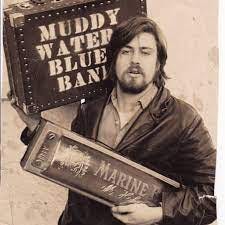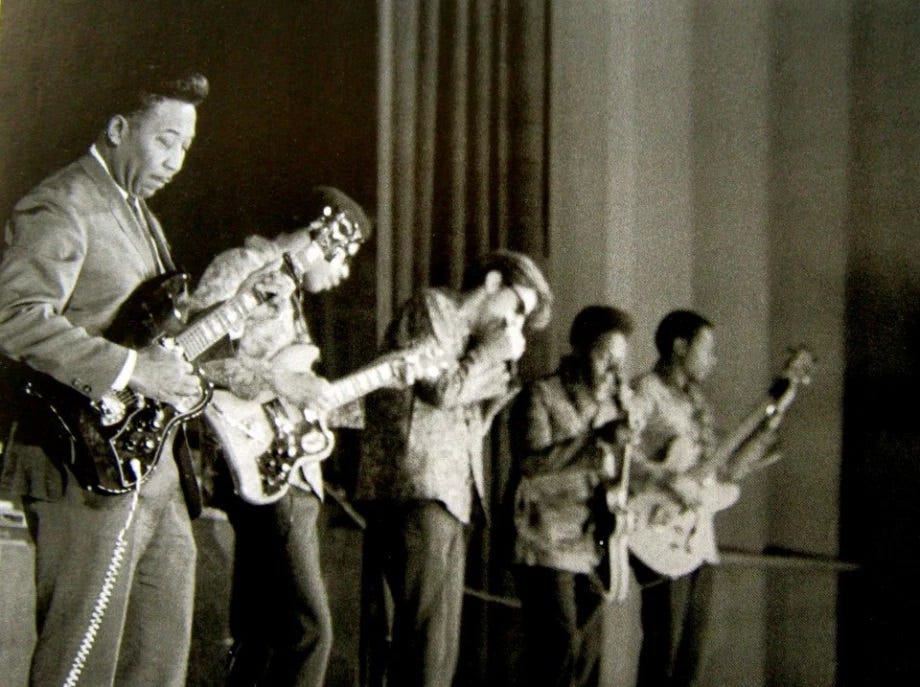Austin is one of music’s great semi-retirement communities. It’s long been home to legendary sideman who’ve done their time on the road, but are not done playing. Earl Poole Ball was Johnny Cash’s piano player for over 20 years, and as a footnote, he produced the original version of “Amarillo By Morning,” by the song’s writer Terry Stafford. And you can see him at the Continental Club most Sundays with Heybale!, which included, for many years, Merle Haggard’s former guitarist Redd Volkaert.
Barry “Frosty” Smith, from Lee Michaels and Sweathog, was the steadiest drummer on the local club scene for 30 years. And what about fiddler Johnny Gimble and pedal steel player Jimmy Day, both among the top five at their instrument in country music history? Before they passed away, we were lucky to be able to see them regularly in 150-capacity venues that became classrooms for the night.
But nobody mixed entertainment with instruction like Paul Oscher, who had almost every local blueshound driving to Railroad BBQ in Manchaca on Tuesday nights in 2013. The sign said “Live Blues,” as if it was a generic band with the dishwasher on bass. Instead you got the man who made history in 1967 by being the first white musician to play in a nationally-known black blues band when he joined Muddy Waters on harmonica.
Looking like a biker Santa, with a white beard, wool cap and sunglasses, Oscher told great stories between songs, like how he got the gig that made him immortal. He met Muddy at the Apollo Theater and played some licks for him in the hallway. The next year, the kid from Brooklyn was hanging around Muddy’s band at the Theresa Hotel in Harlem, when the bandleader wanted to hear some more. Oscher complied, after which Muddy asked, “Can you travel?”
Oscher was 20 when he started blowing harp for the Babe Ruth of Chicago blues. He played Austin’s Vulcan Gas Company with Muddy in 1968, with Johnny Winter opening. But he was five years out of the band by the time Antone’s opened on Sixth Street in 1975 to give Chicago blues icons a whole week to play and hang out. That sure beat a string of one-night stands.
Oscher made the move from L.A. to Manchaca following his divorce from Pulitzer Prize-winning playwright Suzan-Lori Parks, to whom he was married from 2001 to early 2013. Parks was looking to buy a house in East Austin as an investment and told Oscher he could live there for free. But that plan fell through and the 66-year-old musician found himself living in an apartment in Los Angeles. He heard his upstairs neighbor, a summer sublet, playing blues guitar one day and went up and introduced himself to 21-year-old Max Frost, an Austin musician recently signed to Atlantic Records. Oscher told the kid how he almost moved there and Frost said, well, if you still want to do it, I know someone who has a room for rent in Manchaca. That was his mother Lucy Frost.
Two months later, Oscher was standing next to his moving truck in front of his new place in South South Austin when James Cotton, another great former Muddy Waters harmonica player, pulled up. “Hey, Paul, what are YOU doing here?” Cotton yelled out. Oscher knew the only other living pre-‘70’s Muddy band member lived in the Austin area, but didn’t know he was in the same neighborhood. If the Chicago blues world was the New York Yankees, this would be like Yogi Berra and Whitey Ford discovering they lived on the same street in Leander.
Oscher got the idea to start playing at the Railroad BBQ, just a few blocks from his place, when he and Cotton had dinner there one day. He found a stage on Craigslist and got a few guys from the Railroad to help him set it up. It was just a weekly gig to keep his chops up, as Oscher continued to do small tours. But when the word got around the Austin blues community that a living legend was playing it down and dirty on the outskirts, Tuesday night in Manchaca became the place to be.
“When I first started playing with Muddy, the drummer was S.P. Leary,” Oscher said one night from the stage, as all the musicians in the room scooched their chairs an inch closer. “He’d hit the cowbell (as a head’s up) whenever one of the guys’ wives or girlfriends came in the joint.” Oscher’s between-song patter and jive was as much a part of the weekly bluesology course as the music.
Much of Austin blues in the clubs is defined by screeching electric guitar and wailing harmonica, but Oscher’s sets were more like the stuff you might hear on the porch or the alley. Otis Spann, perhaps the greatest blues pianist, taught him how to play the piano, and Oscher learned guitar by studying Muddy and Luther “Georgia Boy Snake” Johnson every night. So he moved effortlessly from harmonica and guitar to keyboards. And he told stories about an amazing life. The same stories that attracted a young and promising African-American playwright, who met Oscher when she put it out that she wanted to learn how to play harmonica.
Two years after Oscher and Parks married, she won the Pulitzer Prize for the play Topdog/ Underdog, which used Oscher’s experience as a three-card monty player as a plot point. “I just wanted to know how they did it,” Oscher said about the card cheat game. “I didn’t have much heart to steal the people’s money.”
Music was all he really cared about. “I got my first harmonica from my uncle when I was 12,” he told the Railroad crowd. “And so I was reading the instruction book and playing like this (weak “Red River Valley”) when one of the guys from the grocery store, a dark-skinned man from Georgia, said ‘Hey, let me see that whistle.’ I said, proudly, ‘it’s not a whistle, it’s a harmonica.’ Well, he took that thing and played something like this (blows lusty Little Walter-like lick) and I’ve been hooked ever since.” The black man was a veteran of medicine shows and showed Oscher all sorts of tricks, like how to play the harp while rotating it in a circle around your mouth.
When Railroad BBQ closed, Oscher moved his one-man show to C-Boy’s on Thursdays. Though it was a nightclub instead of a BBQ joint, the set had the same lowdown music and theater feel. Oscher displayed his guitar prowess on a T-Bone Walker song one night, then told the story of how he came to be Jackie Robinson in reverse. “One day I was just walking down the street in Brooklyn, blowing my harp, and this smooth cat, Smilin’ Pretty Eddie, asked me where I played. I didn’t play anywhere. So he invited me to come inside this club, the Nite Cap, and play a couple songs.” Oscher talked while he fastened his big bass harp onto his neck rack. “When I was done, Pretty Eddie said, ‘let’s hear it for the little blue-eyed soul brother.'” The Nite Cap had a tassle dancer named Lil’ Egypt and when she winked and said “Hey, baby” to Oscher, then 17, he was in the blues life all the way.
He had some funny James Cotton stories, too. “See, Cotton played in that Sonny Boy (Williamson II) style. That’s the guy who raised him up in the blues. But the one thing he couldn’t figure out was that Little Walter warble sound. So when Cotton met Little Walter he asked him to show him how he got that, and Little Walter said, ‘like this’ and turned around so Cotton couldn’t see his face.” Oscher had a lot of stories about how, in the years before YouTube and instructional videos, musicians tried to hold on to their tricks. “I used to tell people I made this from the motorcycle muffler,” he laughed, holding out a Dragonfly bass harp. He used a toilet paper roll for a louder, fuller sound, but painted it silver so it looks like metal.
Just as it helps to be Jewish to get Jackie Mason, musicians laughed the loudest at Oscher’s jokes and observations. You looked around the joint and you’d see Marcia Ball with bass player Sarah Brown, guitar great Denny Freeman, young guitarists like Mike Keller, Willie Pipkin and Eric Zapata and all those harp players like Walter Daniels and Greg Izor and you realized that none of those folks needed to go to Wikipedia to know who Paul Oscher is. They come out to learn more.
“The Muddy band toured in a green Volkswagen bus,” Oscher said, starting the story of his first show with the greatest of all blues band. “We had a show in St. Louis, about a six hour drive. So I get there and Otis Spann, the great Otis Spann, is there with his wife Lucille. ‘Gimme my shit, baby,’ he says and she goes into her bag and hands him a .25 automatic (pistol). Then he goes to S.P. ‘give me a taste, man’ and they pass around a bottle of Gordon’s gin. These are my idols, man! And I’m in the band! I remember the van pulling away and me thinking ‘OK, I’m in it now. I’m in for the ride of my life!’” Indeed!
Sadly, Oscher passed away in April 2021, at age 74, from COVID. But not before he felt the warm embrace of Austin’s blues community. Asked what he liked best about Austin when I interviewed him in late ‘13, he answered, without hesitation, “the other musicians.” It was a group that accepted him instantly because they know their shit.
More Reading:







So good.
yes and if if any way he Paul O was influenced by Otis Spann that’s enough Otis S is so highly thought of